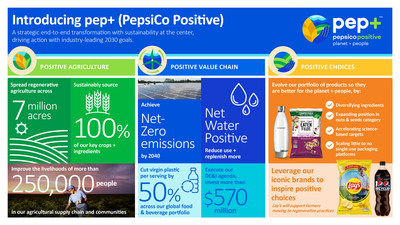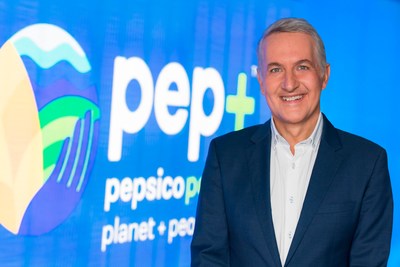In the news release, PepsiCo Announces Strategic End-To-End Transformation: pep+ (PepsiCo Positive), issued Sept. 15, 2021 by PepsiCo, Inc. over PR Newswire, the first paragraph was inadvertently omitted. The complete, corrected release follows:
PepsiCo Announces Strategic End-To-End Transformation: pep+ (PepsiCo Positive)
PURCHASE, N.Y., Sept. 15, 2021 /CNW/ --


Strategic end-to-end transformation to drive sustainable long-term value and competitive advantage. Three pillars of pep+ drive action and industry-leading 2030 goals, including: |
|||
1. |
Positive Agriculture: spreading regenerative practices to restore the Earth across the company's entire agricultural footprint, approximately 7 million acres |
||
2. |
Positive Value Chain: |
||
a. |
Achieving Net-Zero emissions by 2040; |
||
b. |
Becoming Net Water Positive; and |
||
c. |
New goals to improve packaging sustainability, including reducing virgin plastic per serving by 50% and bold new goals from Pepsi and Frito-Lay brands |
||
3. |
Positive Choices: |
||
a. |
Leveraging the scale and reach of its global brands to drive positive impact at scale; |
||
b. |
Evolving its portfolio into spaces that are better for the planet and people, including plant-based proteins, nuts & seeds and whole grains; and |
||
c. |
Expanding its SodaStream business, now expected to avoid more than 200 billion plastic bottles by 2030 |
||
PepsiCo, Inc. (NASDAQ:PEP) today introduced pep+ (pep Positive), a strategic end-to-end transformation with sustainability at the center of how the company will create growth and value by operating within planetary boundaries and inspiring positive change for the planet and people. pep+ will guide how PepsiCo will transform its business operations: from sourcing ingredients and making and selling its products in a more sustainable way, to leveraging its more than one billion connections with consumers each day to take sustainability mainstream and engage people to make choices that are better for themselves and the planet.
"pep+ is the future of our company – a fundamental transformation of what we do and how we do it to create growth and shared value with sustainability and human capital at the center. It reflects a new business reality, where consumers are becoming more interested in the future of the planet and society," said Ramon Laguarta, PepsiCo's Chairman and CEO. "pep+ will change our brands and how they win in the market. For example, imagine Lay's will start with a potato grown sustainably on a regenerative field, and then be cooked and delivered from a Net-Zero and Net Water Positive supply chain, sold in a bio-compostable bag, with the lowest sodium levels in the market. That's a positive choice. That's the best tasting, #1 potato chip of the future. That's how pep+ will be better for people, for the planet, and for our business. Now, imagine the scale and impact when applied to all 23 of our billion-dollar brands."
pep+ drives action and progress across three key pillars, bringing together a number of industry-leading 2030 goals under a comprehensive framework:
- Positive Agriculture: PepsiCo is working to spread regenerative practices to restore the Earth across land equal to the company's entire agricultural footprint (approximately 7 million acres), sustainably source key crops and ingredients, and improve the livelihoods of more than 250,000 people in its agricultural supply chain.
- Positive Value Chain: PepsiCo will help build a circular and inclusive value chain through actions to:
- Achieve Net-Zero emissions by 2040;
- Become Net Water Positive by 2030; and
- Introduce more sustainable packaging into the value chain.
- PepsiCo announced today new goals to cut virgin plastic per serving by 50% across its global food & beverage portfolio by 20301, using 50% recycled content in its plastic packaging and scaling the SodaStream business globally, an innovative platform that almost entirely eliminates the need for beverage packaging, among other levers.
- The company will also progress its more than $570 million diversity, equity and inclusion journey; and
- Today introduced a new global workforce volunteering program, One Smile at a Time, to encourage, support and empower each one of its 291,000 employees to make positive impacts in their local communities.
- Positive Choices: PepsiCo continues to evolve its portfolio of food & beverage products so that they are better for the planet and people, including by:
- Incorporating more diverse ingredients in both new and existing food products that are better for the planet and/or deliver nutritional benefits, prioritizing chickpeas, plant-based proteins and whole grains;
- Expanding its position in the nuts & seeds category, where PepsiCo is already the global branded leader, including leadership positions in Mexico, China and several Western European markets;
- Accelerating its reduction of added sugars and sodium through the use of science-based targets across its portfolio and cooking its food offerings with healthier oils; and
- Continuing to scale new business models that require little or no single-use packaging, including its global SodaStream business – an icon of a Positive Choice and the largest sparkling water brand in the world by volume. SodaStream, already sold in more than 40 countries, is bringing PepsiCo flavor options like Pepsi Zero Sugar, Lipton and bubly to 23 markets, and its new SodaStream Professional platform will expand into functional beverages and reach more than 10 additional markets by the end of 2022, part of the brand's effort to help consumers avoid more than 200 billion plastic bottles by 2030.
"pep+ directly links the future of our business with the future of our planet, for the benefit of both – from how we source ingredients and make and sell our products; to how we inspire consumers through our iconic brands to make better choices for themselves and the planet; to how we support communities and improve livelihoods throughout our supply chain," said Jim Andrew, Chief Sustainability Officer, PepsiCo. "Take SodaStream, for example. By rapidly expanding the SodaStream ecosystem, we are meeting the needs of consumers at home, away from home, and on-the-go. At the same time, we are also offering consumers positive choices that use less plastic, create fewer emissions, and are better for people. pep+ is our roadmap to create the food and drinks people love in a way that helps build the sustainable future we all must have."
The company's brands across its food & beverage portfolio are accelerating their efforts to realize PepsiCo's sustainable packaging vision and leveraging their influence to educate consumers on recycling and the planetary impacts of their choices.
- 11 European markets are moving key Pepsi-branded2 products to 100% rPET bottles by 2022. PepsiCo estimates that shifting to a 100% rPET bottle will lower GHG emissions by approximately 30% per bottle.
- In the U.S., all Pepsi-branded products will be converted to 100% rPET bottles by 2030, with Pepsi Zero Sugar beginning to be sold in 100% rPET bottles by 2022. The brand is celebrating this important move to sustainable packaging with a new consumer-centric platform leveraging fall football and driving recycling awareness, education and advocacy, which are critical because rPET availability depends on consumers' commitment to recycling.
- PepsiCo has been investing in breakthrough food packaging technology and is now introducing a fully compostable bag made with plant-based materials. Starting with Off The Eaten Path, one of Frito-Lay's plant-based brands, this industrially compostable packaging will be available to consumers in the U.S. at Whole Foods stores beginning this month. Notably, the company also announced today that it is willing to work with other companies to license the same technology at no cost given the importance of creating a circular food packaging system.
To learn more about the pep+ agenda, please visit www.pepsico.com/pepsicopositive.
Media Contact: [email protected]
About PepsiCo
PepsiCo products are enjoyed by consumers more than one billion times a day in more than 200 countries and territories around the world. PepsiCo generated more than $70 billion in net revenue in 2020, driven by a complementary food and beverage portfolio that includes Frito-Lay, Gatorade, Pepsi-Cola, Quaker, Tropicana and SodaStream. PepsiCo's product portfolio includes a wide range of enjoyable foods and beverages, including 23 brands that generate more than $1 billion each in estimated annual retail sales. Guiding PepsiCo is our vision to Be the Global Leader in Convenient Foods and Beverages by Winning with Purpose. "Winning with Purpose" reflects our ambition to win sustainably in the marketplace and embed purpose into all aspects of our business strategy and brands. For more information, visit www.pepsico.com.
Cautionary Statement
This release contains statements reflecting our views about our future performance that constitute "forward-looking statements" within the meaning of the Private Securities Litigation Reform Act of 1995. Forward-looking statements are generally identified through the inclusion of words such as "aim," "anticipate," "believe," "drive," "estimate," "expect," "goal," "intend," "may," "plan," "project," "strategy," "target" and "will" or similar statements or variations of such terms and other similar expressions. Forward-looking statements inherently involve risks and uncertainties that could cause actual results to differ materially from those predicted in such statements, including the impact of COVID-19; future demand for PepsiCo's products; damage to PepsiCo's reputation or brand image; issues or concerns with respect to product quality and safety; PepsiCo's ability to compete effectively; water scarcity; changes in the retail landscape or in sales to any key customer; disruption of PepsiCo's supply chain; political or social conditions in the markets where PepsiCo's products are made, manufactured, distributed or sold; future cyber incidents and other disruptions; climate change or measures to address climate change; imposition or proposed imposition of new or increased taxes aimed at PepsiCo's products; imposition of limitations on the marketing or sale of PepsiCo's products; changes in laws and regulations related to the use or disposal of plastics or other packaging of PepsiCo's products; and failure to comply with applicable laws and regulations; and potential liabilities and costs from litigation, claims, legal or regulatory proceedings, inquiries or investigations. For additional information on these and other factors that could cause PepsiCo's actual results to materially differ from those set forth herein, please see PepsiCo's filings with the Securities and Exchange Commission, including its most recent annual report on Form 10-K and subsequent reports on Forms 10-Q and 8-K. Investors are cautioned not to place undue reliance on any such forward-looking statements, which speak only as of the date they are made. PepsiCo undertakes no obligation to update any forward-looking statements, whether as a result of new information, future events or otherwise.
1 Against 2020 baseline.
2 Includes Pepsi, Pepsi MAX, Pepsi MAX Lime, Pepsi MAX without caffeine, Pepsi Light, Pepsi Light without caffeine.
SOURCE PepsiCo, Inc.

Share this article